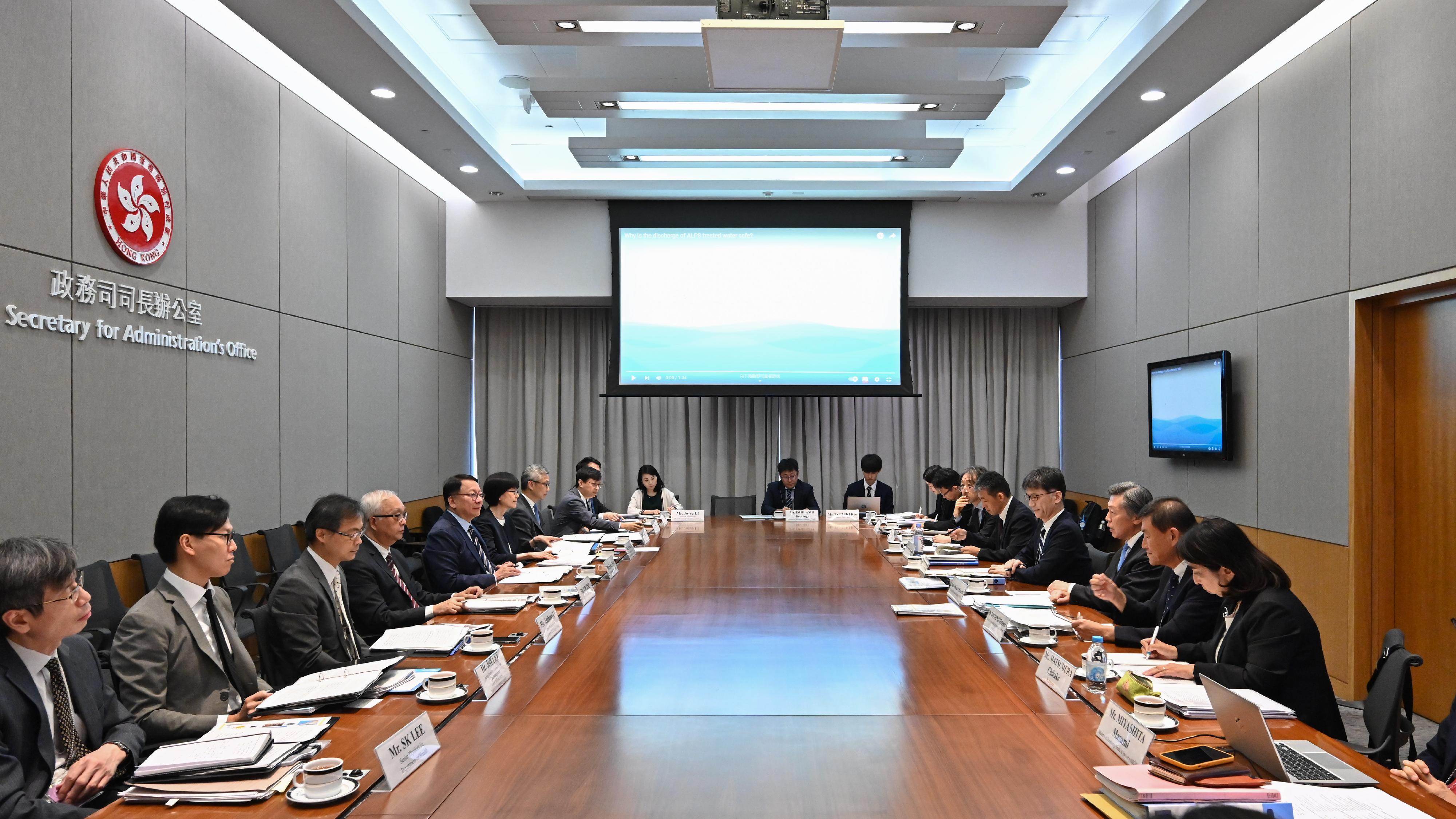Import control measures by HKSAR Government in response to discharge plan of Fukushima nuclear power station (with photo)
******************************************************************************************
The Chief Secretary for Administration, Mr Chan Kwok-ki, and the Secretary for Environment and Ecology, Mr Tse Chin-wan, met with the Consul-General of Japan in Hong Kong, Mr Kenichi Okada, and relevant Japanese officials today, and reiterated to the Japanese side that the Japanese authorities should not discharge the wastewater from the Fukushima nuclear power station (FNPS) into the ocean unilaterally without the consensus of the international community so as to avoid bringing about irreversible impacts on the environment. The discharge plan is unprecedented and would last for 30 years. The wastewater had direct contact with active raw materials of the nuclear reactor and thus contains a high concentration of radioactive substances. During this long period of time, if the purification system fails to operate effectively, it can pose significant risks to food safety and marine ecology. If the Japanese authorities have sufficient confidence in the treatment of the wastewater, they should seek suitable domestic use instead of discharging it into the ocean, thereby transferring the risk to the globe.
The HKSAR Government's inter-departmental taskforce has reviewed the final report of the International Atomic Energy Agency (IAEA) and relevant information provided by Japan. Having considered the final report of the IAEA, relevant information provided by Japan, opinions of the experts in Mainland and risk assessments, the HKSAR Government has come to the view that there is currently no guarantee that the purification system can operate continuously and effectively in the long term after the commencement of the discharge plan, and that the plan will not pose any potential risks to food safety and marine ecology.
Safeguarding food safety and public health in Hong Kong is the responsibility of the HKSAR Government. To ensure that all relevant food imported from Japan is safe and fit for consumption, based on the precautionary principle, the HKSAR Government currently plans to prohibit the import of all aquatic products originating from the ten metropolis/prefectures, namely Tokyo, Fukushima, Chiba, Tochigi, Ibaraki, Gunma, Miyagi, Niigata, Nagano and Saitama, once the Japanese side commences the discharge of wastewater. These aquatic products include all live, frozen, chilled, dried, or otherwise preserved aquatic products, sea salt and unprocessed or processed seaweed.
In addition, the HKSAR Government will maintain the existing import control measures on certain food products against the five prefectures, i.e., Fukushima, Chiba, Tochigi, Ibaraki and Gunma, since the 2011 Fukushima nuclear incident. At present, vegetables, fruits, milk, milk beverages and dried milk originating from Fukushima are banned from importing into Hong Kong while such foods originating from the four prefectures nearby Fukushima, i.e., Chiba, Tochigi, Ibaraki and Gunma, are allowed to be imported on the condition that they are accompanied with a radiation certificate and an exporter certificate issued by the Japanese authority. Chilled or frozen game, meat and poultry and poultry eggs originating from the above five prefectures are allowed to be imported on the condition that they are accompanied with a radiation certificate issued by the Japanese authority which shows the radiation levels do not exceed the Codex Guideline Levels.
As regards media reports claiming the stringent measures imposed by the HKSAR Government were intended to impress Beijing, the HKSAR Government must emphasise that, under "one country, two systems", Hong Kong exercises a high degree of autonomy while preserving our own economic and social systems. Hong Kong is a free port as well as a separate customs territory. The HKSAR Government administers the food safety regulatory regime with regard to the actual situation and considerations in Hong Kong to safeguard food safety and public health.
In formulating the relevant import control measures, the HKSAR Government has made reference to the regulatory measures taken by other economies and considered a host of factors, including the higher risks posed by the aquatic products originating from Fukushima and its nearby coastal prefectures. The HKSAR Government will observe for a period of time after the commencement of the discharge to obtain more monitoring and scientific data in order to further examine the impact of the discharge plan on food safety. Relevant measures will be kept under review.
In the meantime, the Centre for Food Safety (CFS) of the Food and Environmental Hygiene Department will continue enhancing the testing on imported Japanese food and timely adjust the corresponding monitoring work having regard to risk assessment. In fact, the CFS has since mid-June expanded the scope of testing to cover all Japanese aquatic products and stepped up radiological tests on other processed food imported from Japan.
The HKSAR Government will continue to maintain close communication with the Japanese authorities, closely monitor the latest situation regarding import of food from Japan and the discharge plan of the FNPS, and perform risk assessments to help safeguard food safety and public health of citizens in Hong Kong.
Ends/Wednesday, July 12, 2023
Issued at HKT 21:08
Issued at HKT 21:08
NNNN





